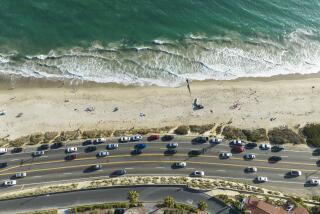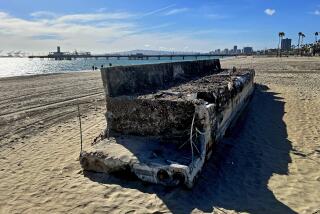Cleanup Resumes as Frothy Oil Found
- Share via
HUNTINGTON BEACH — For the first time in two weeks, oil cleanup crews are back on the beach, this time mopping up a light froth of crude that is washing ashore along a half-mile section of sand, Mayor Thomas J. Mays said Monday.
While Mays said that he believes that the oil is residue from the 394,000-gallon spill from the tanker American Trader, its source will remain unknown until the Coast Guard finishes analyzing a sample in about a week.
The oil--so thin that there are no plans to close the beach--began showing up on Sunday afternoon, Mays said.
“I think this is oil from that spill that got trapped in the rocks and has been released by high tides,” Mays said. “This is not black, heavy oil. It’s brown froth. It hasn’t been bad enough to close any of the beaches.”
The new oil stains are the first since the city officially declared all its beaches clean and safe on March 14, five weeks after the Feb. 7 spill.
Mays said that British Petroleum, which owned the American Trader oil and assumed responsibility for the spill, has also assumed the task of cleaning up the latest stains.
Cleanup crews from the same commercial company hired by British Petroleum are handling the current problem, the mayor said.
The affected stretch of sand lies along the bluffs north of the city’s pier, near the intersection of Golden West Street and Pacific Coast Highway. Fire Chief Ray Picard, in charge of the city’s staffing on oil cleanups, said on Monday that only about half a mile of beach is involved. By contrast, all nine miles of city beaches, as well as those from Crystal Cove north to Newport Beach, were hit following the Feb. 7 spill.
At least two birds, both grebes, got oil on their wings from the latest contamination, Picard said. But the birds survived and were turned over to the state Fish and Game Department. The two birds were found Sunday, he said, and no more soiled birds or sea animals have turned up since.
Picard said there have been no new oil spills anywhere near Huntington Beach, and this residue is different from the tar balls that officials found on the beach two weeks ago and attributed to natural seepage from the sea bottom offshore.
“I assume this (current oil) is associated with the American Trader, but we really don’t know right now,” Picard said. “The Coast Guard has taken samples for analysis.”
Picard said he did not know how many personnel are involved in the current cleanup effort. He said the crews are again using disposable towels to mop up the oil.
Picard said some ocean water immediately north of the pier on Sunday and Monday had an oil-like look, but he blamed it on a small “red tide” of toxic plankton that is often harmful to fish.
In Sacramento, meanwhile, a top British Petroleum executive questioned the need for a proposed state maritime oil spill cleanup fund, arguing that a $1-billion fund being considered in Congress would be sufficient.
“We don’t oppose it,” said James Ross, president of British Petroleum America Inc. “It’s up to the Legislature. . . . We’re simply questioning it. You would be locking up a lot of money that could be used for other things.”
Ross’ remarks came as Legislative committees prepare to hear two major oil cleanup bills, one establishing a $150-million fund and the other a $500-million fund. Both call for the funds to be financed by taxes on oil landed at California ports. The federal legislation would tax oil at all American harbors where oil is landed.
British Petroleum has so far spent more than $20 million cleaning up the Huntington Beach spill. It expects to be reimbursed, however, by its insurance carrier.
United Press International contributed to this report.
More to Read
Sign up for Essential California
The most important California stories and recommendations in your inbox every morning.
You may occasionally receive promotional content from the Los Angeles Times.













